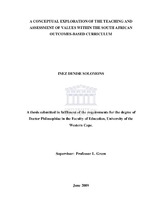A conceptual exploration of the teaching and assessment of values within the South African outcomes-based curriculum
Abstract
Both international and local authors argue strongly that state education systems have an important role to play in the development and nurturing of positive values and attitudes in learners. In some instances, as is the case in South Africa, the education system may even prescribe the values that ought to be taught in the institutions of learning. While I agree that education institutions have a responsibility to teach positive values to learners, it is my contention that it is unlikely that educators will be able to fulfil this role in any meaningful way, without an informed understanding of how to reconcile the tensions between personal and common values, the nature of values knowledge and the complexities and challenges that surround the teaching and assessment of values. This study begins to explore some of these complexities by addressing the historical events, education initiatives and policy decisions that have informed and shaped values education policies in South Africa. I conclude that while the inclusion of values in the curriculum is a commendable education initiative to root democratic values in society, it must be acknowledged that values education inevitably, has a political role to fulfil. The teaching of values knowledge cannot be limited to behaviourist approaches. Learners deserve an education that offers opportunities to them to develop into responsible, caring and morally just citizens. A central aim of values education should thus be to provide learners with opportunities and tools to construct meaning around moral concepts and positive values. I strongly believe that it is unlikely that this will occur if educators are not appropriately capacitated to provide such opportunities to their learners.

